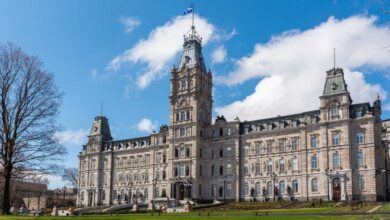Canada Opens Temporary Residence Pathway For Up To 1,000 Palestinians

Canada has opened its temporary resident visa pathway for Palestinians in Gaza who have relatives who are Canadian citizens or permanent residents willing to support them for one year.
Immigration Minister Marc Miller said on Jan. 9 that the new pathway for temporary residents will accept up to 1,000 applications.
“The situation on the ground in Gaza is challenging and volatile,” said Miller. “These new measures provide a humanitarian pathway to safety and recognize the importance of keeping families together given the ongoing crisis.
“We will continue to monitor the situation in Gaza very closely as it evolves and adapt our response accordingly.”
On Oct. 7, the Hamas terrorist group which controls Palestine, launched a surprise attack on Israel, crossing the Jewish state’s borders and killing 1,200 people. Since then, an estimated 6,900 other Israelis have been injured.
Read More Canada Immigration News
Saskatchewan Issues 63 Canada Immigration Invitations In New PNP Draw
Canada’s Employers Must Meet New Temporary Foreign Worker Wage Requirements
Canada To Receive 1,000 Visa Applications from Gazans
Israel’s retaliation has been swift and intense. As the war rages on, the death toll has climbed to roughly 23,000, most of them Palestinians, and much of northern Gaza is now in ruins.
Under the new measure to provide a temporary safe haven for Palestinians directly affected by the crisis in Gaza, eligible family members include a spouse, common-law partner, child, grandchild, sibling, parent or grandparent of a Canadian citizen or permanent resident, as well as their immediate family members (spouse, common-law partner, dependent child and dependent child of a dependent child).
Once they arrive in Canada, those Palestinians will be able to apply for a study permit or open work permit free of charge to support themselves while the crisis in Israel and Palestine continues. They will also have access to three months of health coverage under the Interim Federal Health Program (IFHP) to help address any urgent medical needs upon arrival, as well as settlement services such as language training and support connecting with the labour market and local community.
Watch Video
Immigration, Refugees and Citizenship Canada has also created a dedicated telephone line, at (613) 321-4243 which will accept collect calls for anyone with questions about these special measures.
“The exemptions for temporary resident visa applicants under the public policy expire January 9, 2025, or when 1,000 temporary resident visa applications have been received and accepted for processing, whichever comes first,” notes the IRCC.
Palestinians In Canada On Temporary Visas Will Be Able To Work And Study Here
Exemptions at the port of entry for people who hold a temporary resident visa that was issued under the public policy expire on Jan. 9, 2025 and the temporary resident visas will be valid for up to three years or the length of the person’s passport validity, whichever comes first.
Once in Canada, these Palestinians will be able to acquire more education and Canadian work experience both of which will help them earn points through the Comprehensive Ranking System (CRS) should they ever decide to apply for permanent residence.
Canada operates a two-tier immigration system, accepting applications for permanent residence through its federal Express Entry system’s Federal Skilled Worker (FSW) program, Federal Skilled Trades (FST) program and Canadian Experience Class (CEC), as well as the Provincial Nominee Programs (PNP) of its 10 Canadian provinces.




